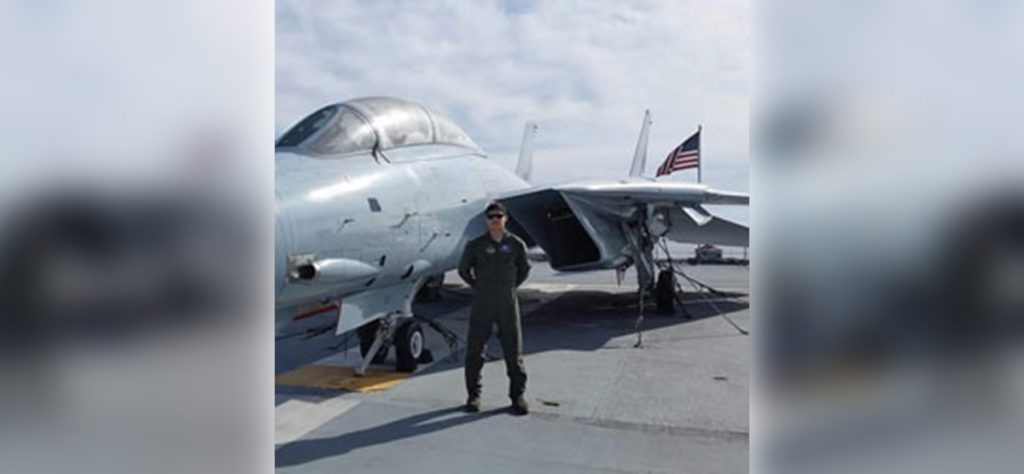
EDITORS NOTE: The excerpt below originally ran in an article on the The Outlook online publication and was written by Clare Maurer. To read the article in its entirety, please click here.
NOTE: Cesar Monterroso (Monmouth ’19) is currently a new member at Delta-Beta Chapter at Monmouth University.
Most college students feel like they have enough problems to warrant all the stress in the world—balancing classes, activities, jobs, and maintaining relationships; however, there is a population of Monmouth students who balance more than the average student could imagine: serving our country at the same time.
Cesar Monterroso, a sophomore criminal justice student, is a prime example of someone leading a life of schoolwork, and a life in the military. He is a member of the United States Reserve, as a Flying Chief for the KC-10A Extender at Joint Base McGuire-Dix-Lakehurst in South New Jersey. “I wanted to join and serve my country, but I also wanted the flexibility of being in the reserves to attend college at the same time,” explained Monterroso. “I joined with the mentality of eventually bettering myself down the road. I also loved being around aircrafts growing up, and even today I am still mesmerized when I walk up to the [aircraft], so it was a win-win situation.”
Another student involved in the military is Samuel Herrara, a senior computer science student, who is also a United States Marine. “My dad was in the Navy when I was young, so I was raised on a Naval Base in South Carolina. My dad is my hero and my greatest influence to be in the military,” Herrara said. “He raised me in a strict military manner, so the military lifestyle is all I ever knew. I specifically chose the Marine Corps because I remember as a young boy I would read about the legacy of the Corps, and I just knew I belonged in the greatest fighting force in the world.”
Being a college student and a member of a military branch are two extremely different ways of life. George M. Kapalka, Ph.D., a professor of professional counseling, explained the differences in the lifestyles, “It is a different mindset. In the military, direction is given ‘from the top’ – it is expected that the commanding officers have most (if not all) the answers and give instructions to those under their directions, and those commands are to be followed precisely and completely,”
Kapalka continued, “A college student is expected to do much more self-starting, and is expected to function more independently. Individual preferences and choices matter and are encouraged. This can be a hard change in mindset for those who primarily experienced military life for a number of years, where life is organized for them…. In college, facing all these decisions that one has to make individually can feel overwhelming.”
Michael Callahan, Coordinator of Veteran Services, pointed out that the differences are unique for every student who comes from any type of military experience, whether it be working the reserves, or veterans starting school after many years in service.
Monterroso has definitely experienced the stress of balancing the two duties. “I was just deployed to Southwest Asia over the summer, right after our spring semester ended. I returned a couple of weeks ago and it took some readjusting on my part being that I was almost three weeks behind with six classes. But with enough determination, anything is doable,” he said.
Monterroso advised, “You just have to find your groove and go with the flow. Being in the military has its advantages when it comes to the experiences you have been through and being able to implement those experiences in class with what you are learning. I also get to fly around the world during the weekends or whenever school is not in session. So it is a great honor being able to serve in that matter.”
On the other hand, military training can provide time management and an effective routine for students. Herrara pointed out, “I accredit my ability to balance being a student and a Marine to my military training. Being a computer science major and minor in physics and exercising three times a day is not easy but I am very disciplined so I manage it well.”
Kapalka expanded on the idea of the differences in daily routine, “In the military, the focus usually is on ‘what I have to do to fulfill my expectations.’ In college, the focus usually is ‘do I know what I choose to do with my life, and do I know how to get there.’
Another difference pertains to amount of structure. In the military, your day is pretty much planned for you. In college, you have to organize yourself to keep up with the material, readings, etc., and set up your own daily structure.”
So what takes priority when you walk down two paths at once? Herrara explained, “School is of course incredibly important, but I would say my top priority is to ensure that I am physically and mentally ready to lead Marines. It’s not about me anymore, it’s about being a great officer for my future Marines and serving for God, country, [and] family.”
Monterroso agreed, saying “School definitely, but when duty calls, duty calls. You have to be willing to put service before self, one hundred percent of the time.”
We have 84 veterans at Monmouth, according to Callahan. That’s a chunk of our student body that you may not have been aware of. Callahan works at ensuring these students and students who are currently serving have a support system and a means of staying on track. “There’s so many variables and it’s so complex. That’s why this office is here, so we offer a bunch of programming to those younger student veterans, then the older student veterans, female student veterans, LGBT student veterans… and also discouraging isolation,” Callahan explained.
If getting involved with serving the country is something you’re interested in or learning more about, talk to any of the students involved and listen to their stories. Herrara said, “It takes a whole new level of commitment and it certainly will not be easy. There’s a reason why Marines are called ‘the few.’ But there’s also a reason why we are ‘the proud.’ And that reason is why this difficult path is worth all the struggle.”
Concluded Monterroso, “Don’t let anyone stop you. Do something you can see yourself doing for many years. The military will not only help you gain skills, but you will get to meet great people along the way.”

 Resources
Resources
